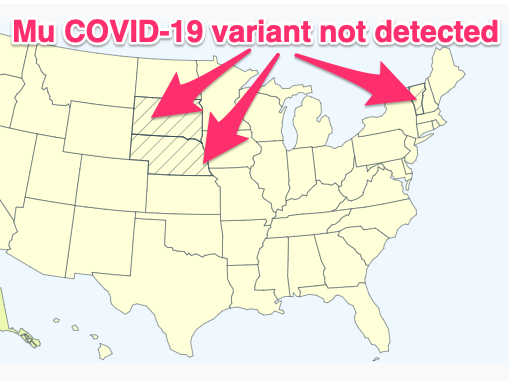
Data from: Outbreak.info
- A new COVID-19 variant called Mu might be able to evade the immunity people get from vaccines, Insider reported.
- The Mu variant has been detected in 47 US states and the District of Columbia, according to data from Outbreak.info.
- Only Nebraska, Vermont and South Nebraska are yet to detect a case, the data says.
- See more stories on Insider's business page.
A new variant of COVID-19, which the World Health Organization (WHO) says could have the ability to evade the immunity people get from vaccines and previous infections, has been detected in almost every US state, according to data from epidemiology and genomic database Outbreak.info.
Called Mu, the B.1.621 variant was first detected in Colombia in January this year. As of September 4, cases of the strain have been reported in 47 US states and the District of Columbia, Newsweek was first to report.
The only states without reported cases are Nebraska, Vermont, and South Dakota, according to Outbreak.info's data.
The strain is currently most prevalent in Alaska, where data suggests that 139 reported cases account for 4 percent of the total 3,837 sequenced samples.
California has the highest number in terms of raw numbers, the data show, with 232 reported cases of the B.1.621 variant out of 139,930 sequenced. This accounts for less than one percent of those sampled.
The Mu variant accounts for fewer than one percent of total COVID-19 cases, with the Delta variant dominant in the US.
Earlier this week, Mu was added to the WHO's "of interest" list of variants.
Anthony Fauci, President Joe Biden's chief medical officer, said Thursday that the Mu variant did not represent an "immediate threat" to the US.
"This variant has a constellation of mutations that suggests that it would evade certain antibodies, not only monoclonal antibodies but vaccine- and convalescent serum-induced antibodies," Fauci said during a COVID-19 press briefing on Thursday. "But there isn't a lot of clinical data to suggest that. It is mostly laboratory in-vitro data," he added.
Fauci said that health officials are "keeping a very close eye" on the situation.
The WHO noted in its weekly bulletin that further studies would need to be done on the mutated variant to see if it can evade immune defenses to COVID-19, Insider's Cheryl Teh reported.